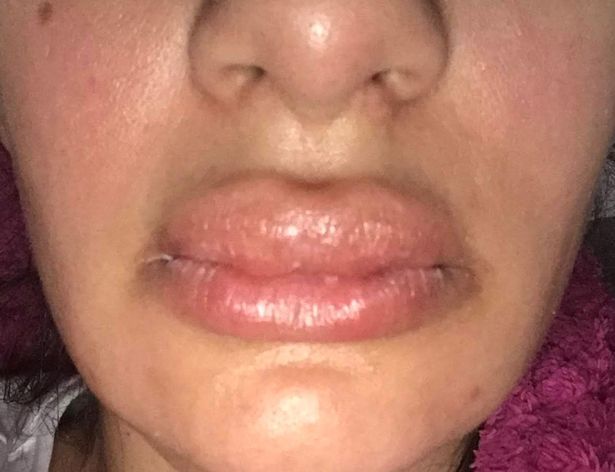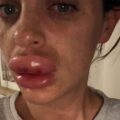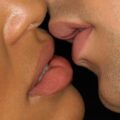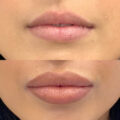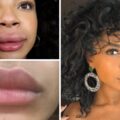Lip fillers, also known as lip injections are injections of collagen or other filler material that give the lips a more plump and full appearance. The injections are composed mainly of hyaluronic acid. Sometimes lip Botox is done for a similar effect, but that’s not considered a dermal filler.
The lip filler procedure takes just a few minutes and is minimally invasive. However, the procedure is not permanent and you will need to get future injections to maintain a plump pout.
You might have swelling or tenderness and bruising after the procedure, though the side effects should be minor. Swelling is the most common side effect and is most apparent in the first 24 hours after getting your injections. Swelling should subside within 2 weeks, and be completely unnoticeable after four weeks.
Bruising at the injection site is another common side effect and will also decrease within the first 2 weeks. If you have significant bruising that lasts longer, or bruising outside of your lips, see your doctor immediately. Pain, redness or itchiness at the injection site are the commonest source of discomfort after lip filler. Some patients complain of severe pain, redness or itching, or pain outside of the lip area, after the procedure.
Aftercare for lip fillers is manageable. If you’re unsure whether the procedure is right for you, it helps to be aware of what to expect during aftercare.
Can I Take Ibuprofen After Lip Filler?
Ibuprofen belongs to a group of drugs called nonsteroidal anti-inflammatory drugs (NSAIDs). These drugs temporarily reduce the amount of prostaglandins made by your body. Your body releases prostaglandins when you have an injury. These hormone-like substances contribute to inflammation, which includes swelling, fever, and increased sensitivity to pain.
Dermatologists recommend that you avoid anti-inflammatory drugs like ibuprofen (Advil, Motrin, Nuprin) for 48 hours after your procedure. Painkillers like acetaminophen, on the other hand, works by blocking the production of pain-causing chemicals in the brain. It is less likely to cause bleeding or bruising, making it a safer option for managing pain after lip filler injections. However, it is important to follow the recommended dose and not exceed the maximum daily limit, as acetaminophen can cause liver damage when taken in large doses.
In some cases, your doctor may prescribe stronger painkillers to manage pain after lip filler injections. These may include opioids such as codeine or hydrocodone, or non-opioid medications such as tramadol. Opioids work by binding to specific receptors in the brain and spinal cord, which can help block pain signals. However, they can be highly addictive and can cause a range of side effects, including dizziness, nausea, and constipation. It is important to only take opioids under the guidance of a doctor and to follow the recommended dose and duration.
Non-opioid medications such as tramadol work by blocking the transmission of pain signals in the brain. They are generally less addictive than opioids and have fewer side effects. However, they can still cause dizziness and nausea, and should be taken only as prescribed.
Topical anesthetics are another option for managing pain after lip filler injections. These are creams or gels that are applied to the skin before the injection to numb the area and reduce pain.
Common topical anesthetics used after lip filler injections include lidocaine and benzocaine. These medications work by blocking nerve signals from the injection site to the brain, reducing pain and discomfort.
It is important to note that topical anesthetics can cause skin irritation and allergic reactions in some people, so it is important to test a small patch of skin before applying them to a larger area.
The use of herbal supplements and vitamins is becoming more and more common, but many of these have the potential to increase the risk of bruising. In particular, high-dose vitamin E, ginkgo biloba, and garlic have case reports and studies demonstrating increased bleeding and/or bruising.
How to Reduce Pain and Swelling After Lip Fillers
Ice: icing helps reduce inflammation in any setting, so it’s a great practice to try right away after treatment. Ice in increments of about 10 minutes to beat potential swelling, you might consider icing after treatment and before any inflammation kicks in. Apply ice to your lips afterward using an ice pack or an ice cube covered in cloth (so it doesn’t stick to the lip and cause pain). This will help ease swelling, itching, bruising, and any other pain.
Cold-Hot Compresses Are Key: Going back and forth between hot and cold is one of the best-known ways to effectively and comfortably reduce swelling and inflammation. By switching back and forth every ten or 20 minutes between hot and cold compresses, you can usher the body back into balance.
Avoid the Sauna: Stay clear from overly hot setting after treatment as inflammation will only increase with prolonged exposure to excessive heat. If you are an avid sauna visitor, please take a few days to break from the activity so that any swelling can subside. Once the balance is re-established, visit as regular.
Opt for Restorative Over Hot Yoga: If you typically go to hot yoga classes, opt-in for restorative yoga for a few days. The temperament climate will keep your body from overheating and the relaxing postures will ease the body of any inflammation it is fighting. Be warned – you might find yourself falling for this gentle yoga practice and become a regular!
Stock Your Pantry with Arnica and Bromaline: Arnica is a natural herb known for its aiding in helping to reduce inflammation. You can apply the ointment topically if your arnica is pure, mix it with jojoba or coconut oil to maximize its benefits and absorption. You can use the arnica as a preventative measure, as well. Applying without current swelling will not hurt you!
Avoid strenuous exercise: for 24 to 48 hours after you get lip or any other dermal fillers avoid strenuous exercise. Elevated blood pressure and heart rate from exercise may make swelling or bruising worse.
Avoid Alcohol: alcohol acts a blood thinner, and should be avoided for at least 24 hours after getting lip fillers. Alcohol can cause inflammation, increase the likelihood of bruising, and make swelling worse. It’s also a good idea to avoid alcohol a few days before your appointment.
Drink Water: drinking plenty of water will help your body heal. Drinking plenty of water can speed up the wound healing process. Whether you are dealing with a surgical wound or one from lip filler, keeping your body hydrated is critical to effective healing.

